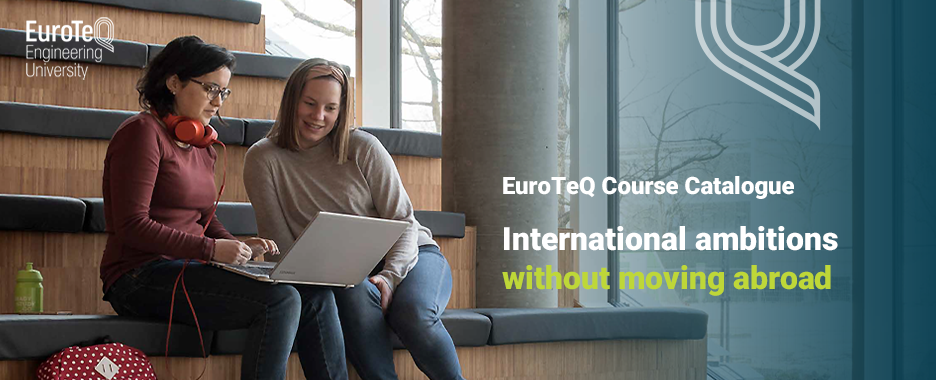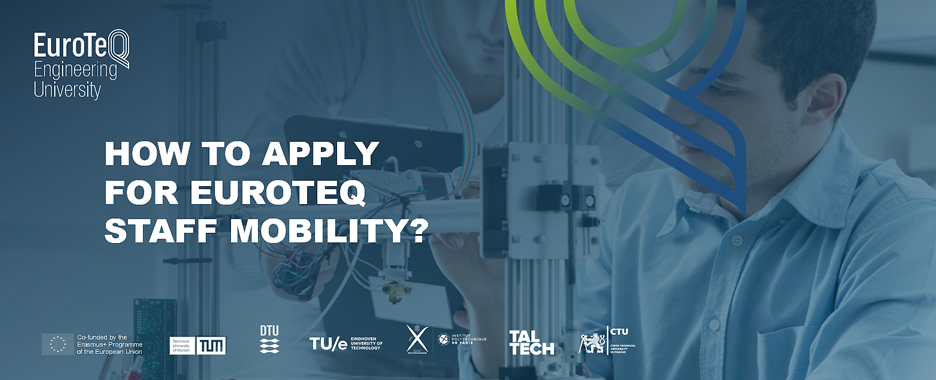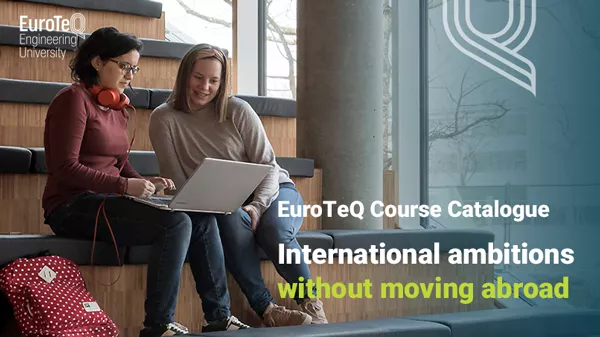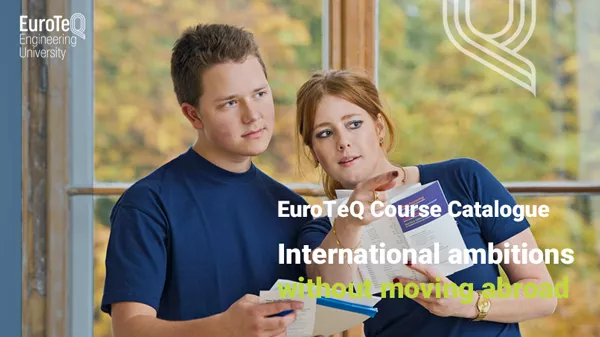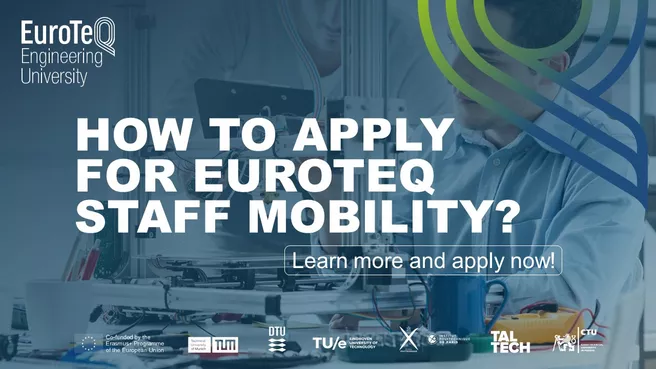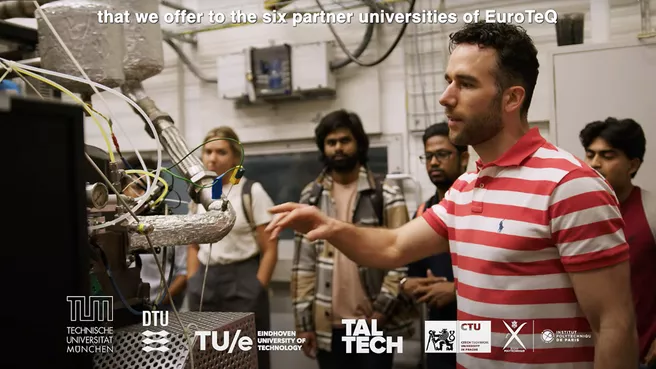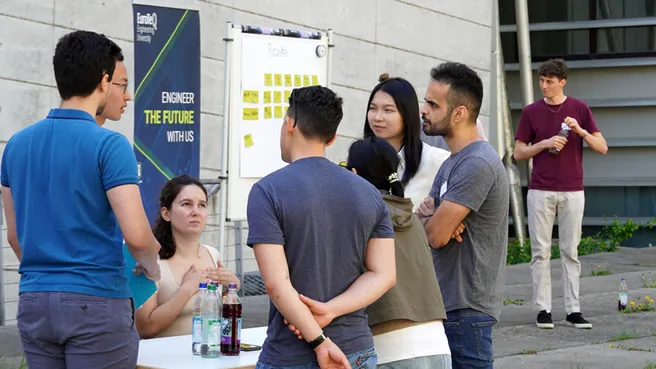The EuroTeQ Engineering University emerges from the EuroTech Universities Alliance. The project shows a clear commitment to intra-European cooperation in higher education – to pool strengths and create synergies.
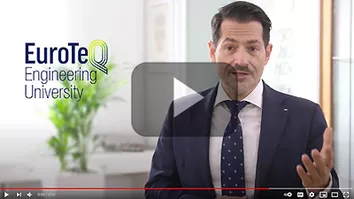
The partner universities involved in this unique project to design a joint engineering education are, in addition to TUM
- Technical University of Denmark (DTU)
- Eindhoven University of Technology (TU/e)
- École Polytechnique (l’X)
- Czech Technical University in Prague (CTU)
- Tallinn University of Technology (TalTech)
- École Polytechnique Fédérale de Lausanne (EPFL)
- HEC Paris (HEC)
- IESE Business School Barcelona (IESE)
Together with our regional and European partners, EuroTeQ shares a common understanding of the competencies that engineers will need to have in the future, in order to understand social processes, implement innovations for the benefit of people, and design sustainable value creation processes.
The EuroTeQ Engineering University is based on this foundation and on a common understanding of European values.
The European Commission defines micro-credentials as "a record of learning outcomes achieved by learners after a short learning experience." This evidence comes in the form of a certificate.
Within the framework of EuroTeQ, micro-credentials will offer both learners and instructors the opportunity to take advantage of additional, interdisciplinary learning opportunities in a flexible manner, starting in the summer term 2023.
Micro-credentials bring together the diverse perspectives and backgrounds of learners and instructors, resulting in a focused learning experience with clearly defined learning objectives that are assessed against transparent standards. Students and teachers from all partner institutions will take part in the courses, thus through the micro-credentials EuroTeQ Engineering University also explicitly promotes the intercultural competence of the participants.
The EuroTeQ partners want to educate the best global talents in science and technology. To this end, they will build a joint, future-oriented engineering study program across disciplines, national borders, and institutions. Its study content extends far beyond the consideration of individual technologies.
Within the program, all learners benefit from individually designed curricula, new digital and challenge-based formats and receive continuous training offers in the spirit of lifelong learning. New course formats and micro-credentials will be developed bottom-up and tested through a call for proposals starting in spring 2021. The ambition is to increase physical and virtual mobility of students and the entire academic and non-academic EuroTeQ community.
The EuroTeQ Campus will also be open to interested parties who have not yet obtained an academic degree or are not aiming for one, but who play important roles in the value creation and communication processes. Offers are designed for and with vocational and professional learners, to strengthen societal cohesion across Europe. Co-creation with industry, engineering associations, and various social sectors is essential in order to identify the challenges of the 21st century and to find joint solutions.
The EuroTeQ Collider is the heart of the joint initiative: students, trainees in technology-related professional fields, and stakeholders from society and industry come together to develop concrete approaches to solving current problems.
The Collider takes place in the form of project weeks, running at the partner universities at the same time. The various projects developed will be presented in a public EuroTeQaThon event.
Under the label EuroTeQ Professional, the Alliance envisions a qualification program for lifelong learning, including a sustainability-oriented exchange between engineers, associations, and stakeholders of local ecosystems as well as SMEs and global companies. The experience gained from the EuroTeQ Collider will make it possible to rethink the current European Qualifications Framework in cooperation with all associated partners of the project, who will jointly contribute to a realistic and generally accepted system of qualification levels in Europe. In addition, a certificate program called EuroTeQ Professional will be created.
The EuroTeQ Connector unites the research agenda of the EuroTeQ Engineering University. Through the interaction between the different social actors, the quality of the project is comprehensively evaluated and the results are attributed accordingly. The goal is to institutionalize active collaboration with all associated partners to guarantee the long-term sustainability of the project.
The complementary Horizon 2020 project BoostEuroTeQ focuses on novel teaching and innovation formats that are created in cooperation with all stakeholders. With a program for learning professionals and qualification offers for engineers with professional experience, the EuroTeQ contribution to lifelong learning becomes even more significant. In addition, BoostEuroTeQ supports the research agenda EuroTeQ Connector with an analysis of the existing instruments for co-creative teaching and innovation as well as a roadmap for the further development of these offers.
In addition to the European initiative, German universities receive funding from the German Academic Exchange Service (DAAD), to support their efforts in becoming a European University. Therefore, at TUM we are able to develop additional offers for students and faculty that support the establishment of the EuroTeQ Campus. The TUM Global & Alumni Office is working together with the TUM Language Center on a series of workshops to raise intercultural awareness specifically for future engineers.
Another task is the development of additional digital study and qualification offers for TUM students that are also open to the alliance partners. For this purpose, TUM and its partners offer a call for proposals for the development of digital initiatives in the field of study and teaching via the EuroTeQ Teaching Fund. In this way, digital formats of teaching, learning, and testing at TUM are advanced and innovative transdisciplinary teaching formats and micro-credentials.
In addition, the TUM Global & Alumni Office is piloting a virtual mobility program for the EuroTeQ Campus to complement physical mobility with Erasmus+. This enriches the study offers with a digital component and within an international classroom at TUM and the partner institutions.
EuroTeQ – a prestige project of the European Commission
The European Universities Initiative, introduced by French President Emmanuel Macron, is one of the European Commission's most prestigious calls for proposals. The objective of this promotional instrument is to establish ambitious European university alliances over the next few years that will make the European university landscape even stronger in the fierce competition with the USA and Asia. The EU is funding the project as part of its European Universities program over the next three years with around five million euros through Erasmus funding and an additional two million euros from Horizon 2020.
